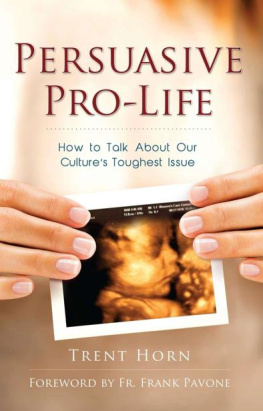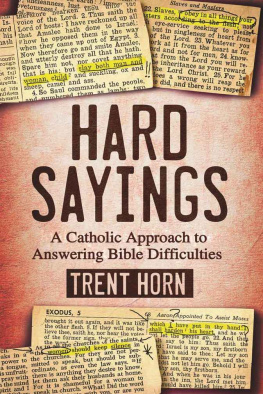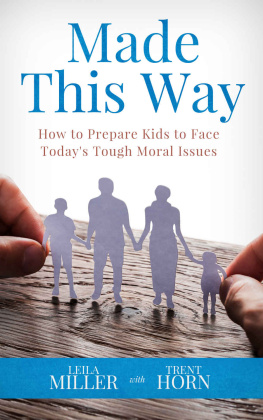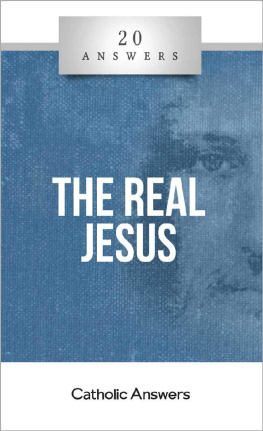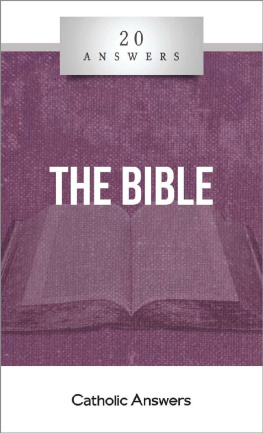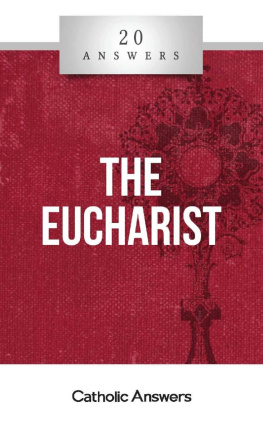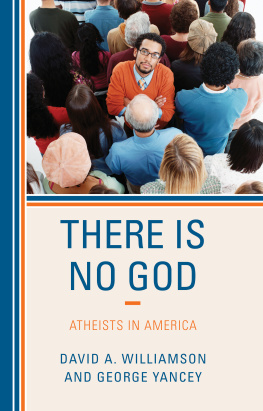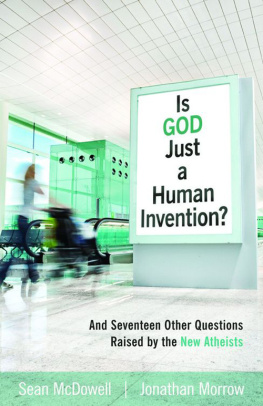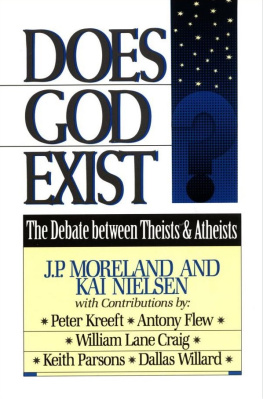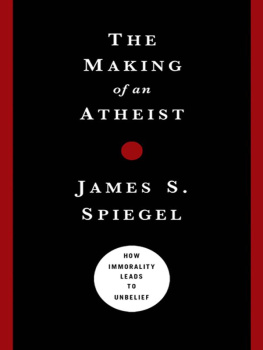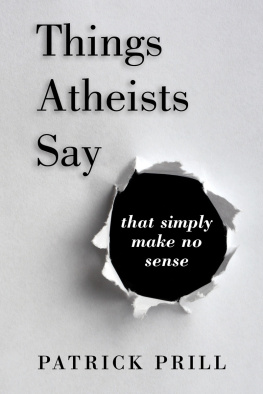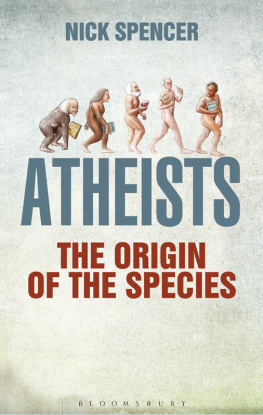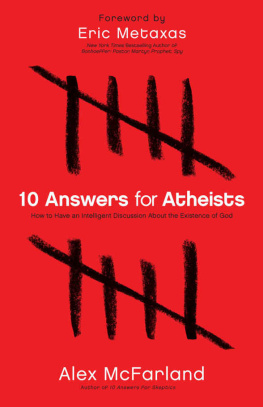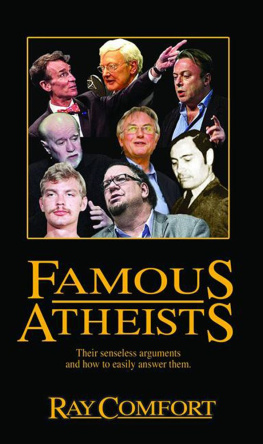Trent Horn
Answering Atheism
How to Make the Case for God
with Logic and Charity

San Diego
2013
2013 Trent Horn
All rights reserved. Except for quotations, no part of this book may be reproduced or transmitted in any form or by any means, electronic or mechanical, including photocopying, recording, uploading to the Internet, or by any information storage and retrieval system, without written permission from the publisher.
Published by Catholic Answers, Inc.
2020 Gillespie Way
El Cajon, California 92020
888-291-8000 orders
619-387-0042 fax
www.catholic.com
Printed in the United States of America
ISBN 978-1-938983-43-6 Answering Atheism
ISBN 978-1-938983-44-3 Answering Atheism (Kindle)
ISBN 978-1-938983-45-0 Answering Atheism (ePub)
For Laura
Acknowledgments
This book would not be possible without the aid of the pro-life organization Justice for All (JFA). Through their outreach events I gained valuable experience in real-world dialogue with students that held a wide variety of worldviews. I would also like to thank Eric Westby, Fr. Matt Lowry, Fr. John Parks, Ryan Howe, and the St. Theresa parish Life Teen program for forming my Catholic faith. I also am indebted to the many scholars and authors (past and present) who artfully defend the Christian faith. In particular, I am grateful for the work of Dr. William Lane Craig, which has immeasurably helped my journey as an apologist. I am also grateful to my fellow apologists and the staff at Catholic Answers, especially acquisitions editor Todd Aglialoro and the director of apologetics Tim Staples, who helped me to refine this manuscript. I feel that this combination of influences will allow this book to benefit both Catholic and non-Catholic readers who are interested in learning how to answer arguments for atheism. And I am thankful for my parents as well as my wife, Laura. She patiently helped me during the writing process and is always an excellent source of inspiration. Above all, I thank God for his grace, which makes all that I do possible. A.M.D.G.
Contents
Part I: The God Debate
Part II: Should I Be an Atheist?
Part III: Should I Believe in God?
INTRODUCTION
Can You Give Me a Good Reason?
From 2009 to 2011, I traveled the country as a pro-life missionary engaging students at public universities in dialogue about abortion. I remember one student I met, named Violet, who said that she resented pro-lifers pushing their religion on her. I said that my case against abortion didnt rely on religion, but that even if it did, why should that matter? Violet retorted, Because Im an atheist! I bet you cant even give me one good reason to believe that God exists.
I responded, I can give you more reasons than that, and we talked for several minutes. Violet was amazed that I was willing to listen to her, that I didnt think her questions were stupid, and that I could give her interesting answers to think about. From one objection to the next, whether it was evolution, faith versus science, or the obnoxiousness of her Christian friends, I helped her see that she actually didnt have any compelling reason to think there was no God. As our conversation ended, Violet became sad, and said to me, If only I had met someone like you when I had so many questions, maybe I wouldnt be an atheist today.
Since that encounter, Ive met many Violets, or people who struggle to have faith in God because they have so many unanswered questions. Youve probably met people like this and wished you had good answers for their thoughtful questions. Or you might be like Violet and have questions no one is willing to answer. I cant promise this book has all the answers youre looking for, but I have done my best to present the best reasons to think God exists. With the task of equipping believers and engaging skeptics in mind, I have set out two goals in my critique of atheism.
Take atheism seriously, but confront it charitably
In recent years, the notoriety of pro-atheism books like The God Delusion, G od Is Not Great, and The End of Faith has led Christian authors to write popular pro-theist apologies in response. Unfortunately, some of these books not only argued against atheism, but mocked it as delusional, incomprehensible, and childish. Others went so far as to attack the character of atheists and accuse them of promoting anti-social behavior, or even genocide! Needless to say, showing them to my atheist friends was not an option, at least if I wanted to still be friends with them.
So how should Christians respond to atheists? First, we must recognize that there are powerful arguments that can be raised in defense of atheism, and those arguments need to be confronted. Secondly, even if the New Atheists like Richard Dawkins or Christopher Hitchens have been less than respectful when writing about religion, that doesnt give Christians a license to be just as disrespectful when writing about atheism. The book of Proverbs puts it well, A soft answer turns away wrath, but a harsh word stirs up anger.
We should also keep in mind that many people who are non-religious dont even call themselves atheiststhey just dont think about God much. The term apatheist has been used to describe people who dont believe in God because they are just too apathetic to think about if he exists or not.
Make the truth accessible both to scholars and laymen
Several years ago when I hosted an answering atheism seminar, I found that I could not recommend to the participants any one book defending the existence of God. Like Goldilocks, who found her porridge either too hot or too cold, I struggled between recommending books that were either too simple or too complex. The benefit of giving someone a simple apologetics book is that he is more likely to read it. The downside is that a shallow book may under-prepare him for the questions that skeptics will inevitably ask. Conversely, a long book by a professional philosopher will be great at preparing people for the tough questions. The downside is that readers who do not have adequate preparation in science or philosophy can become frustrated as they read such dense material. Rather than read such a book, it may just stay in a bookshelf gathering dust.
My approach is a compromise between these two positions. I have included a large number of arguments so that the reader is prepared for a wide variety of conversations, but Ive also explained those arguments with simple illustrations so that the reader is not overwhelmed by them. The more technical or complicated arguments can be found in the appendices.
What to expect
This book is divided into three parts. Part I examines the different views involved in the debate over the existence of God. It also addresses the bad attitudes both theists and atheists sometimes bring to the discussion, and how we can avoid them.
The remainder of the book sets out to defend the following statement: There are no good reasons to think atheism is true, and many reasons to think it is false. In Part II, I answer the question, Should I be an atheist? by examining arguments that attempt to show there is no God. Some of my atheist readers will think this is a backward approach. Why not first prove God exists? That would be the best answer to atheism! But I want to treat atheism with a high level of respect by examining it as a worldview that could be either true or false.
In that regard, I will examine atheists arguments and show that there are in fact no good reasons to think atheism is true. Of course, disproving the arguments for atheism does not prove God exists; we could always be agnostics who just dont know if there is a God. That is why in Part III I will answer the question, Should I believe in God? by examining the arguments for Gods existence. These include the arguments from necessity, first cause, design, morality, and personal experience. Finally, I go Beyond the God Debate and tackle the more existential or practical objections to belief in God.
Next page

